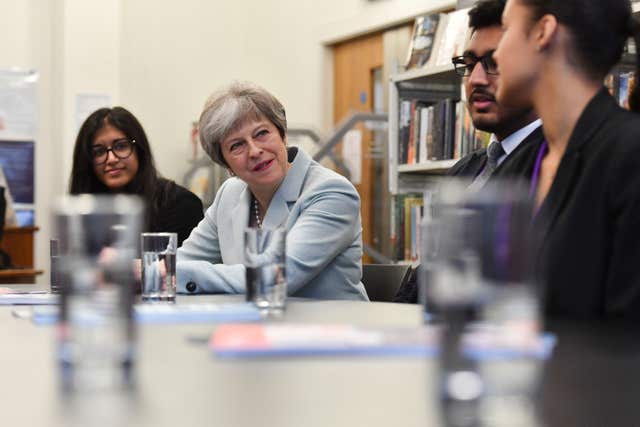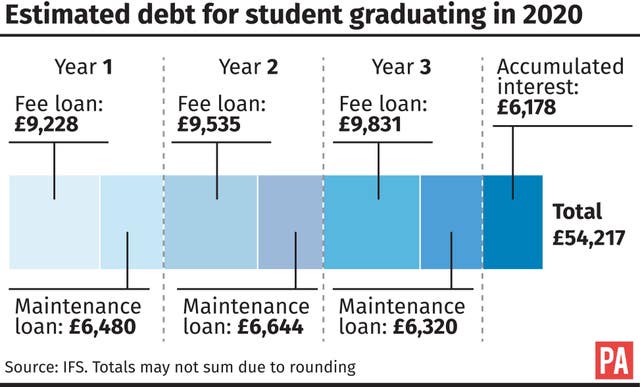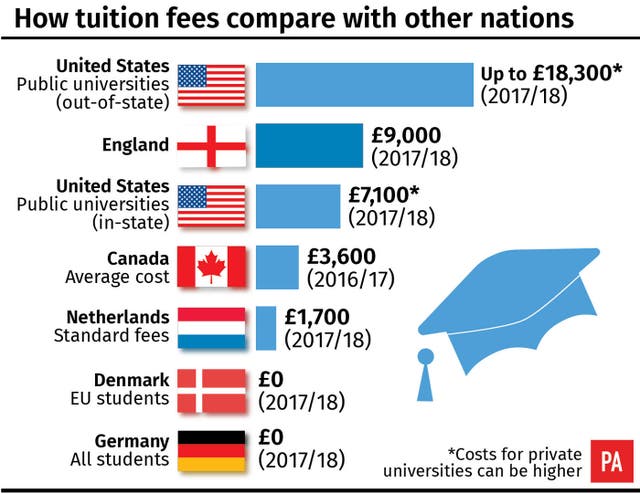
Britain’s education system needs to be more “flexible and diverse” than it is today, Theresa May has said, warning that the needs of all children are not being met.
Formally announcing a long-awaited review of post-18 education, the Prime Minister acknowledged that the level of tuition fees charged do not relate to the cost or quality of the course.
The review, which will be led by finance expert and author Philip Augar, will focus on four key questions, Mrs May said: ensuring education is accessible to all, the funding system, encouraging choice and competition and providing the skills the country needs.

Tuition fees in England were trebled in 2012, and the vast majority of courses now cost the maximum, £9,250 per year.
According to estimates by the Institute for Fiscal Studies (IFS), the average student can now leave university owing more than £50,000.
In a speech in Derbyshire this afternoon, Mrs May argued: “We must have an education system at all levels which serves the needs of every child.
“And if we consider the experience which many young people have of our system as it is, it is clear that we do not have such a system today.”
The Prime Minister has announced a wide-ranging review of higher education, focussing on four key areas #HEreview pic.twitter.com/qeWLLavQoN
— Press Association (@PA) February 19, 2018
To give youngsters the skills they need to succeed, they need “an education and training system which is more flexible and more diverse than it is today,” the Prime Minister added.
Mrs May insisted that it is right that students contribute to the cost of their education, but that the review, which is expected to take about a year, will look at how much they contribute, the terms of their contribution and the duration.
“I believe – as do most people, including students – that those who benefit directly from higher education should contribute directly towards the cost of it,” she said.
“That is only fair.”

Shifting the burden of university tuition onto the taxpayer would mean tax increases for the majority of people who did not go to university, leave universities competing with schools and hospitals for funding and lead to the re-introduction of a cap on student numbers, Mrs May argued.
Mrs May addressed an audience at Derby College of further education officials as well as education ministers Anne Milton, Nick Gibb and Sam Gyimah.
However, the visit was during the half term and so just a handful of students and teachers were there to hear her speak.
Shadow education secretary Angela Rayner said: “This long-winded review is an unnecessary waste of time. Labour will abolish tuition fees, bring back maintenance grants and provide free, lifelong education in further education colleges.”
Ahead of the formal launch, Mrs May admitted that tuition fees are among the most expensive in the world and acknowledged the concerns of students, parents and grandparents about the levels of debt faced by graduates.
My thoughts on why the #HEreview is needed. pic.twitter.com/j8tb9pCqaA
— Sam Gyimah MP (@SamGyimah) February 19, 2018
The PM finally acknowledged our tuition fees are among the most expensive in the world in her speech today. The year long review headed up by a retired financier is not the answer, we know what needs to be done now let's get on with resolving the issues affecting so many now.
— Angela Rayner (@AngelaRayner) February 19, 2018
The review, pledged by the Prime Minister last autumn, comes amid widespread concern about the debt burden on students and the high interest rates, currently 6.1%, on loans, as well as whether students are receiving value for money.
The debate over university finance was initially sparked in part by a Labour Party election pledge to scrap tuition fees for future students.

Nick Hillman, director of the Higher Education Policy Institute (HEPI) said: “The review team start with enormous expectations on their shoulders. People want them to reduce tuition fees for some or all courses, lower the interest rate on student loans, bring back maintenance grants, help part-time and mature learners and bolster further education colleges.
“The Government has encouraged this speculation but it will be hard to satisfy all the hopes, especially if the Treasury is not willing to allow additional public spending on post-compulsory education. So the review team have a very big challenge.”
Dr Tim Bradshaw, Chief Executive of the Russell Group, which represents 24 leading universities, said: “We look forward to engaging with the review, which will need to consider how to provide sustainable funding for universities, alongside fairness to students and taxpayers, and improvements to student choice and access.”
He added: “It will be important for the review panel to look at all aspects of university funding, rather than focusing on tuition fees in isolation. A whole-system approach is needed to avoid unintended consequences of changes in one area impacting on another.”


Comments: Our rules
We want our comments to be a lively and valuable part of our community - a place where readers can debate and engage with the most important local issues. The ability to comment on our stories is a privilege, not a right, however, and that privilege may be withdrawn if it is abused or misused.
Please report any comments that break our rules.
Read the rules hereLast Updated:
Report this comment Cancel